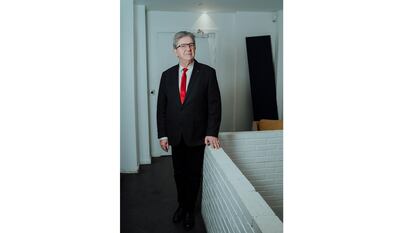France’s leftist leader Mélenchon: ‘Macron cannot endure 30 months of appointing governments every three months’
The head of La France Insoumise says they will keep using no-confidence votes against the French president, whom he accuses of ignoring the result of the election and of sinking the country into crisis

France is in crisis and without a government. And if one starts from the end of this story, one of the main explanations can be found in the headquarters of La France Insoumise (LFI), one of the left-wing parties that make up the New Popular Front (NFP), the progressive alliance that won the last legislative elections and drafted the no-confidence vote that ended Michel Barnier’s government last week with help from the votes of the far right. Why? Because the result of the election, they claimed, was ignored and the president of the Republic, Emmanuel Macron, insisted on building a conservative executive. Its leader, 73-year-old Jean-Luc Mélenchon, the leading and the most radical voice of this alliance, has not stopped asking for the resignation of the head of state since then. And he will continue to do so until it happens, he warns.
Mélenchon received EL PAÍS and the newspaper La Repubblica, both members of the LENA news media alliance, at the offices of LFI, a sort of labyrinthine warehouse full of offices and all kinds of posters and election brochures. This was not the best day for him. On Friday morning he had learned that the Socialist Party (PS), one of the parties that make up the NFP, has broken the left’s unity. The PS, led by Olivier Faure, had just met with President Macron at the Elysée to offer him support in forming an executive with reciprocal concessions. It is a unilateral negotiation that for Mélenchon means the breaking up of the left’s unity. “The New Popular Front will continue without them. We will not govern with this right-wing bloc in decline,” he proclaims.
Question. In July you predicted a political crisis that could turn into a regime crisis. Are we there yet?
Answer. Macron said he had dissolved the Assembly to “bring clarity” and to avoid facing a budget debate this year without a majority. Since the elections, his situation has worsened. Without a majority, it was obvious that he would resort to Article 49.3 [allowing the executive to approve major measures by decree] and that, also automatically, we would table a no-confidence motion. We did this 17 times last year on the budget!
Q. This time with the support of [far-right National Rally leader] Marine Le Pen’s lawmakers.
A. Macron says this to cause controversy and to harm us. In reality, our no-confidence motion is a very harsh text against the far right. Moreover, for something to be a majority, two blocks must vote together. Should we have asked that the votes of the far right not be counted? That is not possible. Two months ago, Le Pen did not support our motion against Barnier. Macron did not reject her abstention.
Q. Has Le Pen, who had promised in September not to censure Barnier’s government, changed her strategy following the request for disqualification in her trial for misappropriation of European funds?
A. Ask her! We have repeatedly said that thanks to her, Barnier’s government was maintained. Our message was clear to the popular sectors: they are voting for someone who claims to be against the system, but who is part of it. I once called her the “life insurance” for Macron’s system. Seeing the polls, in which more than 60% wanted to oust Barnier, in the end she gave in.
Q. Would it be a risk for French democracy if Le Pen were unable to run for the Elysée because of a court conviction?
A. If she is convicted, if the judges consider it a proven fact, it is a normal course of events. But it is not acceptable that a sentence be imposed before she can appeal. However, that is what the public prosecutor has requested. Since the prosecutor is acting under government directives, Le Pen may interpret this as an attempt to eliminate her.
Q. In Italy or Spain, when politics is blocked, parties make concessions and pacts with opposing forces.
A. Repeating endlessly that the left must come to terms with the right is dangerous. It produces governments willing to sell their souls just to stay in power. The result? [Italian PM Georgia] Meloni. We refuse to betray our voters for office. We apply our platform without compromise. Democracy is not consensus! On the contrary, when you organize a consensus between reasonable parties, what options do the discontent have? Only the far right remains for them. This has happened all over Europe. Forgive me if I get carried away, but without our opposition to liberalism, my country could allow the far right to win.

Q. Macron has called you “extremely irresponsible” along with Le Pen.
A. We are used to these insults. Censorship is in the Constitution, I did not invent it. Nor was it I who created another trillion euros in debt or chaos in this country. Macron recently wanted to send troops to Russia. France has been expelled from Africa. That is his balance sheet. He demands that the French view all this as normal, that they submit, that they cheer him on after returning from Saudi Arabia. France is wealthier than ever, but its people are poorer than they were 20 years ago. And we should keep quiet and “be responsible”? Being responsible means pointing out the problem: him. He will not finish his term if there is a no-confidence vote every two months.
Q. If the PS reaches an agreement with Macron to form a government, would it be the end of the NFP?
A. The NFP will continue without them. We will not govern with this right-wing bloc in decline. Look how they insult those they call the “French on paper.” My maternal grandfather was a Spaniard from Valencia, and his father chose France to escape the dictatorship. Are we back to the same thing? No. France must not discriminate based on origin or religion.
Q. Have you spoken to Olivier Faure about the talks for a new government?
A. No, we have been hit with a fait accompli. It is a brutal, personal method. Faure likes to bluff. His party won 1.67% of the vote in the presidential election, yet he wants to be prime minister for the left! He has a high opinion of himself and often makes harsh remarks about me. The grand coalition has been the dream of several French socialists for 40 years.
Q. Will the next government face a no-confidence motion if it has the support of the PS?
A. There will be one every time Article 49.3 is invoked. We will continue until we achieve it. Macron will end up leaving; he cannot endure 30 months of appointing Barnier governments every three months.
Q. Macron has said he will not resign before 2027.
A. It is logical for him to say that. But where will he find a majority of 289 lawmakers to approve the next budget? Without that, there will be another Article 49.3, another no-confidence motion and another government that will fall.
Q. Are you ready to be a presidential candidate?
A. Our organization is ready. We have active bases, our platform is up to date. But we have not yet decided on a candidate. It is a collective decision.
Q. Are you passionate about the revolutionary spirit?
A. Passion is not the right word. I am an intellectual, author of 22 books. The history of France shows that it does not know how to enact reform without great events. We propose a Constituent Assembly and a Sixth Republic. It is our citizen revolution.
Q. Would you have gone to Notre Dame cathedral as president?
A. Yes. Although I am not religious, I cried when Notre Dame burned. It is a work that belongs to all humanity.
Q. Macron has managed to meet that challenge.
A. It was a collective work that showcases French talent. I am looking forward to seeing the renovated cathedral.
Sign up for our weekly newsletter to get more English-language news coverage from EL PAÍS USA Edition
Tu suscripción se está usando en otro dispositivo
¿Quieres añadir otro usuario a tu suscripción?
Si continúas leyendo en este dispositivo, no se podrá leer en el otro.
FlechaTu suscripción se está usando en otro dispositivo y solo puedes acceder a EL PAÍS desde un dispositivo a la vez.
Si quieres compartir tu cuenta, cambia tu suscripción a la modalidad Premium, así podrás añadir otro usuario. Cada uno accederá con su propia cuenta de email, lo que os permitirá personalizar vuestra experiencia en EL PAÍS.
¿Tienes una suscripción de empresa? Accede aquí para contratar más cuentas.
En el caso de no saber quién está usando tu cuenta, te recomendamos cambiar tu contraseña aquí.
Si decides continuar compartiendo tu cuenta, este mensaje se mostrará en tu dispositivo y en el de la otra persona que está usando tu cuenta de forma indefinida, afectando a tu experiencia de lectura. Puedes consultar aquí los términos y condiciones de la suscripción digital.









































